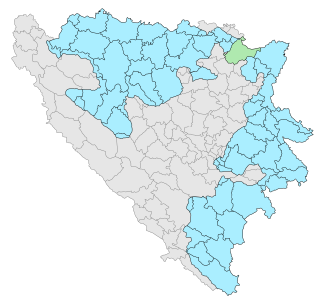| Izgori | |
|---|---|
| Village | |
 | |
| Coordinates: 43°16′29″N18°37′20″E / 43.27472°N 18.62222°E | |
| Country | Bosnia and Herzegovina |
| Entity | Republika Srpska |
| Municipality | Gacko |
| Elevation | 1,283 m (4,209 ft) |
| Time zone | CET (UTC+1) |
| • Summer (DST) | CEST (UTC+2) |
| Area code(s) | (=387) 029 |
Izgori (Serbian Cyrillic : Изгори) is a village in the municipality of Trebinje, Republika Srpska, Bosnia and Herzegovina. [1]
The Serbian Cyrillic alphabet is an adaptation of the Cyrillic script for Serbo-Croatian, developed in 1818 by Serbian linguist Vuk Karadžić. It is one of the two alphabets used to write standard modern Serbian, Bosnian and Montenegrin, the other being Latin. In Croatian, only the Latin alphabet is used.

A village is a clustered human settlement or community, larger than a hamlet but smaller than a town, with a population ranging from a few hundred to a few thousand. Though villages are often located in rural areas, the term urban village is also applied to certain urban neighborhoods. Villages are normally permanent, with fixed dwellings; however, transient villages can occur. Further, the dwellings of a village are fairly close to one another, not scattered broadly over the landscape, as a dispersed settlement.

Under the "Law on Territorial Organization and Local Self-Government" adopted in 1994, Republika Srpska was divided into 80 municipalities. After the conclusion of the Dayton Peace Agreement, the law was amended in 1996 to reflect the changes to the entity's borders and now provides for the division of Republika Srpska into 64 municipalities.


